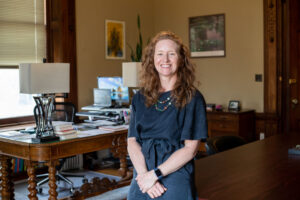These are challenging times in higher education, but you wouldn’t have known it on a high-summer day at Manhattanville College in Purchase. Children engaged in camp activities threaded the lush quad, their voices echoing all the way to Reid Hall – the 1892 Renaissance Revival castle that was once the home of publisher-diplomat Whitelaw Reid and now serves as the college’s administration building.
Inside the hall, cool pink marble dominates the foyer and the magisterial staircase that leads to the offices of new President Frank D. Sánchez, Ph.D., and Provost and Executive Vice President Christine Dehne, a multimedia artist who contributed to two works recently produced on Broadway. (See profiles.)
The June U.S. Supreme Court decisions that struck down affirmative action and the Biden Administration’s student loan forgiveness program have sent some colleges scrambling. But in interviews with Westfair, Sánchez and Dehne said that Manhattanville is poised to meet the educational hurdles of our time.
“Affirmative action affects the super-elite Ivy League schools,” Dehne said, alluding to the suit brought against Harvard College that led in part to the Supreme Court decision. “Nonetheless, we at Manhattanville value diversity.”
Indeed, the 182-year-old college has been ranked the number-one private, nonprofit school in New York state for social mobility for two years by U.S. News and World Report in its Regional Universities North category. The college has earned a designation as a Hispanic Serving Institution by the U.S. Department of Education. Close to 40% of Manhattanville’s students identify as Hispanic. When Sánchez came on board July 3 – with perfect timing, he said jokingly, right before a holiday – he became not only the college’s 15th president but its first Latino one.
While achieving diversity is not a problem for Manhattanville, all schools have a stake in the subject of student loan debt, because its specter may deter some students from enrolling in college.
“Enrollment is a tremendous challenge,” Sánchez said, due in part not only to college costs but a declining population in the Northeast – although he added that Manhattanville’s enrollment is projected to be up 3% this fall. Student loan debt also has a profound effect on the economy, he said, because it lessens the debtor’s purchasing power.
High tuition and related expenditures have helped shape a different world today, said Dehne, who oversees academic and student affairs for approximately 1,300 undergraduates and nearly 1,000 graduate students.
“Students are very focused on getting a job,” she said. They’re living at home longer. And their parents are struggling to justify the cost of a college education: They want a return on their investment.
At Manhattanville, tuition is $40,850 for the coming academic year, and 98% of students receive some form of financial aid. Sánchez’s ability to balance academic excellence with its financial underpinnings, demonstrated in his previous roles as president of Rhode Island College (RIC) and vice chancellor of student affairs at City University of New York (CUNY), is one of the reasons he was chosen president, the search committee said.
“As the college adapts to the changing needs of students and the world, it has increasingly embraced an ethos of innovation with new approaches to academic program development, technology, interdisciplinarity, research and the student experience,” Manhattanville Faculty Council co-chair Christopher Pappas, Ph.D., a member of the presidential search committee, said in a statement. Pappas, professor of biology and chair of the Division of Natural Science, Mathematics and Computing, added, “The college has made bold, strategic moves in recent years – reimagining the liberal arts for today’s needs, adding programs in nursing, the health sciences, the natural sciences, data science and computer science. The college is well-positioned to propel forward with Dr. Sánchez at the helm.”
In “reimagining the liberal arts for today’s needs,” some colleges and universities have downgraded the arts and humanities in favor of STEM (science, technology, engineering and math) courses. But Sánchez said, “I think the humanities, the arts and the fine arts are critical to a socially responsible, engaged citizenry.”
As for making education more affordable, he said that the states play a role in this. He pointed to two programs in Rhode Island – the Rhode Island Promise Scholarship, which enables students right out of high school to pursue a two-year associate’s degree at Community College of Rhode Island (CCRI) tuition-free; while the Rhode Island College Hope Scholarship provides last-dollar tuition and mandatory fee payments to in-state students at the college for their junior and senior years, if they are in good academic standing, with a 2.5 GPA (grade point average) or higher, and on track to graduate or earn an approved certificate in four years.
Sánchez said RIC students have also saved money with online textbooks. At Manhattanville, 4+1 programs in some disciplines allow students to earn bachelor’s and master’s degrees in five years, instead of six, another savings.
There are ways to provide students with more financial help, he said.



Frank D. Sánchez – a passion for education
“I’ve been a witness to the power of education to transform lives,” Frank D. Sánchez said.
He grew up in Cheyenne, Wyoming, the son of a mother who emigrated from Mexico and a father, born and raised in Cheyenne, who dropped out of high school. But his mother earned her associate’s degree and became an administrative assistant in a kindergarten through 12th grade environment, while his father, having served in the Marines, got his GED high school equivalency diploma, a bachelor’s degree and two master’s degrees and became a principal in his hometown.
In just two generations, Sánchez has become the first Latino president of Manhattanville College in Purchase, having served as the first president of color at Rhode Island College (RIC), a school with 7,000 students and an annual budget of $180 million; and, prior to that, as vice chancellor for student affairs at the City University of New York (CUNY), the nation’s largest urban public university, with 25 colleges and graduate schools.
At Rhode Island College from 2016 to ‘22, he elevated the school’s U.S. News and World Report social mobility ranking to number two among New England public institutions, growing student diversity, modernizing academic facilities and significantly increasing fundraising. During his presidency, the endowment at RIC grew from $28 to $42 million and federal and state grants increased to $10.3 million annually.
At CUNY, Sánchez spearheaded the first system-wide strategic plan for student affairs, supporting more than 500,000 students. He also created many workforce development initiatives with public, private and nonprofit organizations; helmed the development of the nation’s largest military-friendly higher education system; established citywide partnerships to support foster youth; and helped connect city, state and federal resources to the most economically disadvantaged students.
Said CUNY Chancellor Felix V. Matos Rodriguez, Ph.D.: “During his years at CUNY and throughout his career, Dr. Sánchez has been known as an innovative advocate for student success, launching and expanding initiatives that emphasized the critical benefits of holistic support in boosting colleges’ retention and graduation rates. With his passion for making higher education ever more equitable, inclusive and responsive to the needs of an increasingly diverse student population, Dr. Sánchez is poised and well-equipped to lead Manhattanville College to a bright future.”
“Passion” is perhaps the key word in that statement. Talking with Sánchez about his move to Manhattanville was like having a tutorial with a favorite professor. His is a warm, accommodating presence contained in the compact form of the college wrestler he once was. He brimmed with enthusiasm for his new assignment. Why did he want to come to Manhattanville?
In part because of its “ethos of innovation in curriculum,” he said, including interdisciplinary self-designed majors; and the Center for Design Thinking (CDT), where students, faculty and community members come together at the President’s Cottage to take a multidisciplinary approach to creating practical solutions to some of today’s problems.
Sánchez has long been interested in students. At the University of Nebraska-Lincoln where he received a Bachelor of Arts degree in psychology, he was an RA (resident adviser), a peer mentor to dormitory students. He has a Master of Science degree in student affairs and higher education from Colorado State University, and a Ph.D. in higher education administration from Indiana University, Bloomington.
His well-rounded approach to education can be seen in his service in Rhode Island, where he was a member of the United Way of Rhode Island board of directors, the Greater Providence Chamber of Commerce, the Providence Performing Arts Council and the NCAA Division III Presidents’ Council.
The father of three grown sons, Sánchez may be new to Manhattanville and Purchase, but he’s not new to Westchester County. When he was at CUNY, he lived in Pelham for three years.
“I like it here,” he said.
Christine Dehne – enriching lives from cradle to cap and gown
Being a college professor goes hand in hand with doing research and publishing. For Christine Dehne, provost and executive vice president of Manhattanville College in Purchase, research took a most unusual form when she was a professor in the Department of Communication and Media, teaching video production, animation and multimedia.
“My research was my artwork,” she said of a creative pursuit that would take her all the way to Broadway.
Dehne contributed to two productions by Spellbound Theatre, an immersive artists collaborative, that were recently presented to young children at The New Victory Theater on 42nd Street in Manhattan. She was the devising artist for “Shakespeare’s Stars,” which she described as using the Bard’s own words about the sky to create a multisensory experience for children ranging in age from a few months to 5 and their caregivers. It was staged in the theater’s lobby in a tent with cushions, because actual seating would fold on tiny theatergoers, she said.
She was also responsible for the animations in “Wink,” a show for older children about the adventures of a young girl and her teddy bear. Using shadow puppetry in a traditional theater setting, “Wink” was inspired by Eugene Field’s beloved 1889 poem “Wynken, Blynken and Nod,” about the nocturnal journey of a babe in his cradle.
For children and caregivers alike, the works “allow you to enjoy the wonders of childhood,” she said.
At a time when some colleges are cutting arts and humanities courses in favor of seemingly more useful and job-friendly STEM work, Dehne is a good example of what you can do with a Bachelor of Arts degree in philosophy (from Tufts University), a Bachelor of Fine Arts degree (from the School of the Museum of Fine Arts at Tufts in Boston) and a Master of Fine Arts degree (from the University of Arizona).
Before coming to Manhattanville – where she served as dean of the School of Arts and Sciences prior to becoming provost — Dehne taught at Harvard University, Emerson College, Brown University and the University of West Florida, displaying her videos and multimedia work in New York, Massachusetts, California, Canada and Tokyo. With Spellbound, Dehne has been awarded residencies at The New Victory Theater and the Miranda Arts Project Space (MAPSpace) in Port Chester and grants from ArtsWestchester, the Brooklyn Arts Council and The Jim Henson Foundation. She was the artist/co-creator of the show “The World Inside Me,” which was co-produced with the Chicago Children’s Theatre and staged at the Chicago Children’s Theatre, Miami Theatre Center (MTC) and then at The New Victory Theater.
With two children ages 14 and 11 and her administrative career, the Purchase resident has less time these days for her art, a lot of which she does on her iPad. A senior member of the President’s Cabinet at the college, Dehne is working with teams of staff, faculty and students on curriculum revisions.
Still, in her daytime career and side art, Dehne has the satisfaction of knowing she has reached young people from the cradle to cap and gown.



















